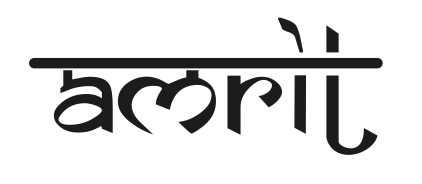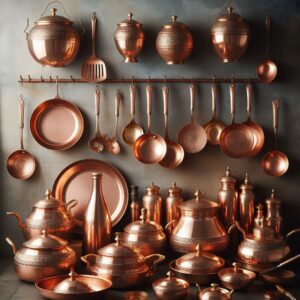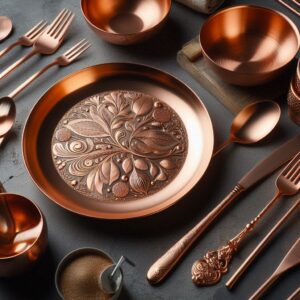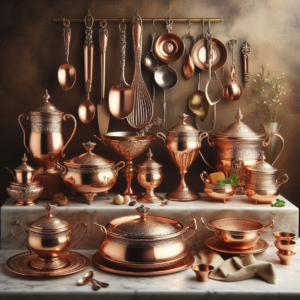Uncovering the Health Benefits of Copper
The Hidden Power of Copper
Many people overlook copper when considering their health, but the health benefits of copper are significant. This essential trace mineral is not just a part of your copper water bottle or copper pots. It plays a vital role in maintaining overall health and well-being.
Why the Health Benefits of Copper Matter
Understanding the health benefits of copper is crucial. This mineral supports several key bodily functions. For example, copper helps boost your immune system, supports cardiovascular health, and promotes healthy skin and connective tissues. It also aids in iron absorption, which is important for preventing anemia.
Everyday Copper and Your Health
You might use copper vessels or pure copper utensils daily, yet their health benefits are often underestimated. Using a copper thali set or copper water bottle can be more than just stylish; it can contribute to your health. Knowing these benefits can help you make better choices about incorporating copper into your life.
In short, the health benefits of copper are essential. By learning more about copper and its effects on your body, you can enhance your well-being and make informed choices about its use in your daily life.
What is Copper? Exploring the Health Benefits of Copper
Definition and Types:
Copper is an essential trace mineral crucial for good health. The health benefits of copper are numerous, including supporting immune function and aiding in iron absorption. It appears in different forms and is a vital component in both everyday products and biological processes. You might find copper in items like a copper water bottle or pure copper utensils.
Sources of Copper: In Your Diet
You can easily add copper to your diet through natural sources. Nuts, seeds, and seafood are rich in copper and offer great health benefits. Including these foods in your meals helps you get enough copper. Using copper pots or a copper thali set in your kitchen can also provide benefits. These everyday items enhance your intake of this essential mineral.
Daily Recommended Intake: Meeting Your Copper Needs
For optimal health, adults should consume about 900 micrograms of copper daily. Meeting this recommendation supports the health benefits of copper. Incorporating copper-rich foods into your diet and using items like a copper water bottle ensures you meet your daily needs.

In summary, copper is a valuable mineral with many health benefits. Understanding its sources and daily requirements helps you make informed choices about how to include it in your life.
Health Benefits of Copper
Enhances Immune Function: Discover the Health Benefits of Copper
Copper is crucial for a robust immune system. It supports the production and maintenance of healthy white blood cells, which are essential for fighting off infections. Research consistently shows that adequate copper levels significantly improve immune response and reduce the risk of illnesses. For instance, incorporating copper vessels or using a copper water bottle can help ensure you get sufficient copper, thus boosting your overall health.
Supports Cardiovascular Health: The Health Benefits of Copper for Your Heart
Furthermore, copper plays an important role in cardiovascular health. It helps maintain the elasticity of blood vessels and supports the cardiovascular system’s proper function. Studies indicate that copper reduces the risk of cardiovascular diseases by preventing damage to blood vessels. Therefore, integrating copper pots into your cooking routine can enhance your copper intake, contributing to better heart health.
Promotes Healthy Skin and Connective Tissue: How the Health Benefits of Copper Affect Your Skin
Additionally, copper is vital for healthy skin and connective tissue. It aids in collagen production, which is crucial for skin strength and elasticity. Several studies link copper to improved skin health, showing that it helps repair and regenerate tissues. Consequently, using pure copper utensils or a copper thali set can be a stylish way to support your skin’s health while benefiting from the mineral’s properties.
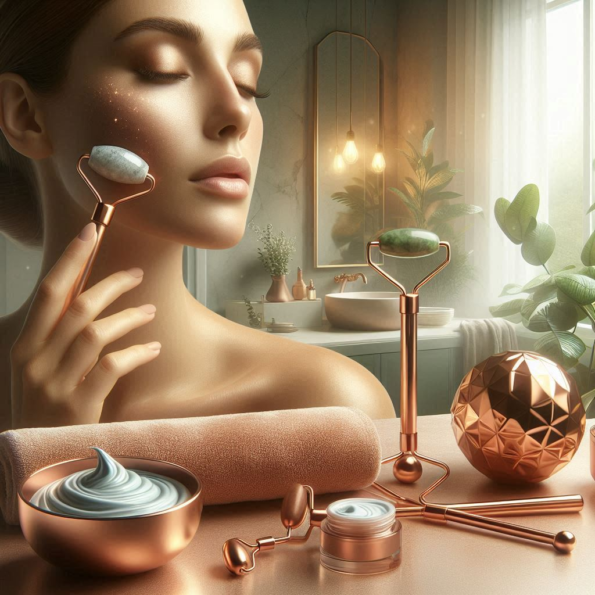
Assists in Iron Absorption: The Health Benefits of Copper in Combating Anemia
Moreover, copper enhances your body’s ability to absorb iron. This interaction is critical for preventing iron deficiency anemia. Copper ensures that dietary iron is utilized effectively, supporting overall health. Thus, including copper-rich foods in your diet or using a copper water bottle can help maintain your copper levels and improve your body’s iron absorption.
In conclusion, the health benefits of copper are extensive. From boosting immune function to promoting heart health and enhancing skin, copper plays a significant role in maintaining overall well-being. Incorporating copper-rich items into your daily life, such as copper vessels or copper pots, can help you maximize these benefits.
Signs of Copper Deficiency and How to Address It
Symptoms of Copper Deficiency: Recognizing the Health Benefits of Copper
If you have a copper deficiency, you might notice several symptoms. For instance, fatigue, frequent infections, and slow wound healing are common signs. Additionally, you may experience unexplained weight loss and brittle bones. Therefore, observing these symptoms can indicate a copper deficiency. This lack impacts your overall health and highlights the importance of understanding the health benefits of copper.
Health Implications: Understanding the Impact of Low Copper Levels
Low copper levels can lead to various health problems. For example, it can cause anemia because of poor iron absorption. Furthermore, it can negatively affect cardiovascular health and weaken your immune system. Consequently, chronic copper deficiency can result in serious issues like osteoporosis and neurological disorders. Recognizing these implications emphasizes the need for adequate copper intake.
Diagnosis and Treatment: Ensuring You Get the Health Benefits of Copper
To diagnose copper deficiency, healthcare providers typically perform blood tests. If results show low copper levels, they may suggest dietary changes or supplements. For instance, using copper vessels or a copper water bottle can increase your copper intake naturally. Additionally, incorporating these items into your daily routine, along with eating copper-rich foods, helps manage and prevent deficiency.
In conclusion, recognizing the signs of copper deficiency and addressing them is crucial. Thus, understanding the health benefits of copper and incorporating solutions like a copper thali set or copper pots into your lifestyle supports optimal health.
Copper Toxicity and Safety: Understanding the Health Benefits of Copper
Risk of Excess: Potential Risks and Symptoms of Too Much Copper
While copper is beneficial, excess copper can cause problems. Too much copper can lead to symptoms such as nausea, abdominal pain, and headaches. In more severe cases, it might result in liver damage or gastrointestinal issues. Therefore, monitoring your copper intake is crucial to avoid these risks. Recognizing these symptoms helps manage your copper levels effectively while still benefiting from its health advantages.
Safe Dosage: Recommended Upper Limits and Safe Consumption Practices
To prevent toxicity, follow the recommended upper limits for copper intake. The upper limit for adults is about 10,000 micrograms per day. Adhering to this guideline helps avoid excess copper. For example, when using copper vessels or a copper water bottle, ensure that your total copper intake remains within safe levels. Balancing your copper consumption is essential to enjoy benefits of copper without the risks.
Balancing Intake: Tips for Maintaining Optimal Copper Levels Without Overconsumption
To maintain optimal copper levels, use copper products wisely. Incorporating items like a copper thali set or copper pots into your routine can be beneficial. However, it is important to balance their use with a varied diet to prevent overconsumption. Additionally, avoid excessive copper supplements. Regularly check your intake and consult with a healthcare provider if necessary. This balanced approach ensures you gain benefits of copper while avoiding potential toxicity.
In conclusion, managing copper intake carefully is key to enjoying its health benefits. By using copper products thoughtfully and following safety guidelines, you can maintain a healthy balance.
Incorporating Copper into Your Diet: Maximizing the Health Benefits of Copper
Dietary Sources: Foods Rich in Copper for Optimal Health Benefits
To enjoy the health benefits of copper, start by adding copper-rich foods to your diet. Foods like nuts, seeds, and seafood are excellent sources. For example, almonds, sunflower seeds, and shellfish provide significant amounts of copper. Additionally, whole grains and dark leafy greens also contribute to your daily copper intake. Including these foods regularly can help you maintain optimal copper levels and support overall health.
Supplementation: When and How to Consider Copper Supplements
If you struggle to get enough copper from your diet, supplements might be an option. Consult with a healthcare provider before starting any supplements. They can recommend the right dosage based on your needs. When using supplements, choose high-quality products and follow the recommended guidelines to avoid excess copper intake. Proper supplementation can complement your diet and enhance benefits of copper.
Practical Tips: Easy Ways to Include Copper-Rich Foods in Daily Meals
Incorporating more copper into your daily meals can be simple. For instance, use a copper water bottle or cook with copper pots to enhance your copper intake. Include nuts and seeds in snacks or salads. Add seafood to your weekly meal plan. Using a copper thali set for your meals not only looks elegant but also contributes to your copper intake. These practical tips make it easy to enjoy the numerous benefits of copper.
In summary, integrating copper-rich foods into your diet and considering supplements when necessary can help you reap the health benefits of copper. Use copper products like a copper thali set or pure copper utensils to further support your copper levels while enhancing your overall health.
Conclusion: Embracing the Health Benefits of Copper
Summary: Key Points
In summary, he health benefits of copper are significant and varied. This essential mineral supports immune function, cardiovascular health, and skin integrity. It also aids in iron absorption, preventing anemia. Incorporating copper into your daily life through copper vessels, a copper water bottle, or a copper thali set can enhance these benefits.
Call to Action: Evaluate Your Copper Intake
Take a moment to evaluate your copper intake. Ensure you are getting enough copper through your diet or consider using copper-rich products like pure copper utensils. Consulting with a healthcare provider can provide personalized advice and help you manage your copper levels effectively.
Final Thoughts: Importance of Balance and Awareness
Balancing copper intake is crucial for reaping its benefits without overconsumption. Awareness and moderation are key to maintaining optimal health. By integrating copper into your daily routine thoughtfully, you can enjoy the full spectrum of its health benefits. Embrace the role of copper in your well-being and make informed choices for a healthier lifestyle. Get your own for a better healthy life buy the best copper water bottles from The Amrit Life today!
